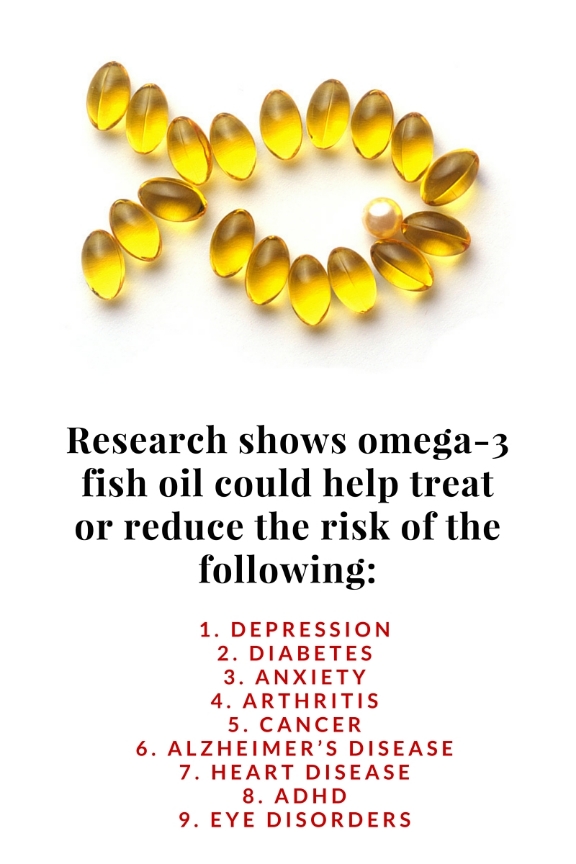 Omega-3 fatty acids are essential to your diet and health, because the body can’t make them, so they must be obtained from food. That said, not all sources of omega-3 fatty acids are the same.
Omega-3 fatty acids are essential to your diet and health, because the body can’t make them, so they must be obtained from food. That said, not all sources of omega-3 fatty acids are the same.
For instance, alpha-linolenic acid is found in plant-based sources such as walnuts and flaxseed. On the other hand, many of the benefits of omega-3 fatty acids come from fatty fish such as salmon, rainbow trout, mackerel, herring, sardines, and tuna.
Fish oil is particular is good source of omega-3 fatty acids (1). The benefits of omega-3 fish oil mostly come from two types of omega-3s: eicosapentaenoic acid (EPA) and docosahexaenoic acid (DHA).
Side Effects of Omega-3 Deficiency
What happens when you don’t get enough omega-3s in your diet? Unfortunately, this is a problem for many Americans. In the U.S., omega-3 fatty acid deficiencies are linked to the top causes of death, mostly because of an imbalance between omega-3 and omega-6 fatty acids. Omega-6 is still an essential fatty acid, but when high amounts of omega-6 are consumed with low amounts of omega-3, inflammation and chronic illness can result.
The average American consumes omega-6 to omega-3 fatty acids in a 20:1 ratio, because omega-6 is a common part of the Standard American Diet, found in dairy, meats, fast foods, and fried foods, which contain seed and vegetable oils such as canola, soybean, corn, and cottonseed. An omega-3 and omega-6 imbalance can lead to a number of health problems, including heart disease, obesity, cancer, irritable bowel syndrome, macular degeneration, type 2 diabetes, autoimmune disease, and asthma.
9 Omega-3 Fish Oil Benefits

There are a number of health benefits associated with omega-3 fish oil (2). Scientific research has even proven there are more benefits in fish oil and DHA/EPA than in flaxseed oil or ALA. The following are some of the top health benefits associated with omega-3 fish oil—research shows it could help treat or reduce the risk of the following:
1. Depression
Research suggests that omega-3 deficiencies are related to an increased rate of depression. An omega-3 fish oil depression formula is the way to go when it comes to these disorders, as it’s considered to be a natural mood stabilizer. Countries with higher rates of fish oil consumption also have lower rates of depressive disorders. A recent study published in the journal Nutritional Neuroscience suggests that increasing DHA and EPA consumption with fish oil decreases major depression disorder symptoms by 40% (3). Fish oil supplementation also improved the nutritional and amino acid content in the right dorsolateral prefrontal cortex in adolescents with major depressive disorder.natural mood stabilizer. Countries with higher rates of fish oil consumption also have lower rates of depressive disorders. A recent study published in the journal Nutritional Neuroscience suggests that increasing DHA and EPA consumption with fish oil decreases major depression disorder symptoms by 40%. Fish oil supplementation also improved the nutritional and amino acid content in the right dorsolateral prefrontal cortex in adolescents with major depressive disorder.
2. Diabetes
In a study published in the journal Brain Research in 2014, fish oil was found to reduce the risk of diabetics developing cognitive deficit due to the protective effect it has on hippocampus cells (4). The researchers also found that fish oil reversed oxidative stress, which is one of the root causes of type 2 diabetes. Other studies have also found that omega-3 fatty acids help reduce the onset of type 1 diabetes.
3. Anxiety
Like depression, anxiety is also linked to a lower level of omega-3 fatty acids. A study published in the European Journal of Neuroscience in 2014 showed that fish oil effectively treated anxious and depressive behaviors induced in rats. The researchers recommended fish oil supplementation during critical periods of brain development. This touches on the importance of giving children fish oil early in life to help prevent anxiety and depression as they age.
4. Arthritis
Fish oil is also thought to be very supportive in the treatment of osteoarthritis and rheumatoid arthritis. Studies have found that DHA and EPA can decrease pro-inflammatory mediators and increase joint lubrication. A study published in the journal Alternative Therapies in Health and Medicine in 2010 found that fish oil is an effective treatment for osteoarthritis (5). Also, a study published in the journal Arthritis and Rheumatism in 1995 found that rheumatoid arthritis patients taking fish oil had improved joint function (6), and some patients were even able to discontinue the use of non-steroidal anti-inflammatory drugs.
5. Cancer
Fish oil has been found to treat various cancers, including breast, colon, and prostate cancer. In a study published in the journal Cancer Chemotherapy and Pharmacology in 2014, researchers found that omega-3 fish oil could make cancer cells more vulnerable to anti-cancer drugs, and could also help mitigate the side effects of those drugs (7). Another 2014 study published in the journal PLOS ONE found that DHA and EPA in fish oil decrease the risk of prostate cancer (8). Other studies have also suggested that fish oil may help prevent melanoma.
6. Alzheimer’s Disease
The DHA in fish oil is considered critical for brain function and reducing inflammation. In a study published in the Alzheimer’s & Dementia in 2010, researchers found that 900 milligrams daily of DHA for 24 weeks improved memory and learning function in age-related cognitive decline (9). Fish oil supplementation can therefore be used in the treatment of Alzheimer’s disease.
7. Heart Disease
Omega-3 fish oil can help prevent and manage heart disease. Studies have found that omega-3 fatty acids help reduce triglycerides, slow the development of plaque in the arteries, reduce the risk of abnormal heart rhythms, decrease the chance of strokes and heart attacks, and reduce the likelihood of sudden cardiac death in those with heart disease. Multiple studies have also indicated that omega-3 fish oil supplementation can help lower blood pressure. Hypertension is another risk factor associated with heart disease.
8. ADHD
Omega-3 fatty acid deficiencies are linked to attention deficit hyperactivity disorder (ADHD) in both adults and children. Fish oils are thought to alleviate ADHD symptoms such as restlessness, inattention, and hyperactivity, and decrease aggression, impulsivity, anxiety, and anger. A study published in the journal Paediatrics & Child Health in 2009 found that omega-3 fish oil supplementation can help manage ADHD symptoms (10).
9. Eye Disorders
The high DHA and EPA in fish oil has been found to be essential in the treatment of eye disorders such as dry eyes, cataracts, and age-related macular degeneration (AMD). A study published in the journal Investigative Ophthalmology & Visual Science in 2014 found that omega-3 fish oil may benefit those at high risk of neovascular AMD (11).
Other Omega-3 Fish Oil Benefits
Weight Loss

You can also use omega-3 fish oils for weight loss. In a four-week study published in the International Journal of Obesity in 2007, researchers found that those who supplemented with fatty fish or fish oil lost approximately two more pounds after four weeks than those who didn’t use those supplements (12).
Skin and Hair Health

Evidence also suggests that omega-3 fish oil can benefit skin conditions, including psoriasis and eczema. You can also use omega-3 fish oils as an acne solution. Omega-3 fish oil also benefits the hair by treating dandruff and thinning hair.
Fertility and Pregnancy

Recent studies have also shown that fish oil consumption can improve fertility in both women and men. DHA in particular improves the mobility and health of sperm in men. Fish oil can increase fertility in women by balancing hormones, regulating menstrual cycles, and reducing inflammation. Fish oil can also treat conditions related to infertility such as endometriosis and polycystic ovarian syndrome.
Other Benefits
Other conditions that omega-3 fish oil may help improve include arrhythmias, benign prostate hyperplasia, chronic sinusitis, inflammatory bowel disease, multiple sclerosis, menorrhagia, asthma, Lyme disease, migraines, metabolic syndrome, neck pain, fibromyalgia, osteoporosis, uterine fibroids, and Parkinson’s disease.
5 Omega-3 Fish Oil Side Effects
Is there a downside to omega-3 fish oil supplements? Some research that indicates that fish oil can cause organ damage, atherosclerosis, inflammation, and even cancer. However, the fish oil used in those studies was rancid or oxidized fish oil. Here are some of the side effects that may result from rancid omega-3 fish oil.
1. Low blood pressure:
As mentioned, fish oil is used to treat high blood pressure. However, fish oil may cause blood pressure to drop too low in those who are already using blood-pressure-lowering medications.
2. Liver disease:
Fish oil is thought to increase the risk of bleeding in liver disease patients with liver scarring.
3. Fish allergy:
People who are allergic to fish may also react to fish oil supplementation.
4. Depressive disorders:
Fish oil may increase the symptoms of depression and bipolar disorder.
5. HIV/AIDS:
High fish oil dosages are thought to lower the immune system response of the body. This may be a problem for those who already have an weak immune system, including people with HIV/AIDS.
Other Side Effects
Other omega-3 fish oil side effects include diabetes, cancer risk in people with familial adenomatous polyposis, and an irregular heartbeat in patients with an implanted defibrillator.
Possible Interactions
Certain medications may interact with fish oil including: blood-thinning medications such as warfarin, clopedigrel, and aspirin; anticoagulant and antiplatelet drugs; birth control pills such as ethinyl estradiol and levonorgestrel; and high blood pressure drugs such as captopril, enalapril, and losartan.
How to Use Omega-3 Fish Oil
The most common fish used in fish oil supplements include herring, pollock, tuna, halibut, sardines, mackerel, salmon, and cod. These fish contain the highest amount of DHA and EPA. For most people, 1,000 milligrams is the best omega-3 fish oil dosage per day.
It’s important to note that not all fish oils are created equally. Many fish oils are highly processed and can therefore oxidize easily due to polyunsaturated omega-3 fats with a low heat threshold, which means that fish oil can easily go rancid. Omega-3 fish oil benefits are dependent on how you store your oil, so keep it away from natural light, preferably in a cool, dark place (a cupboard will do). Some omega-3 liquids should also be stored in the refrigerator once the bottle has been opened. It’s also a good idea to purchase small containers of fish oil since the bigger containers have a greater chance to oxidize before they’re finished.
Read Next:
